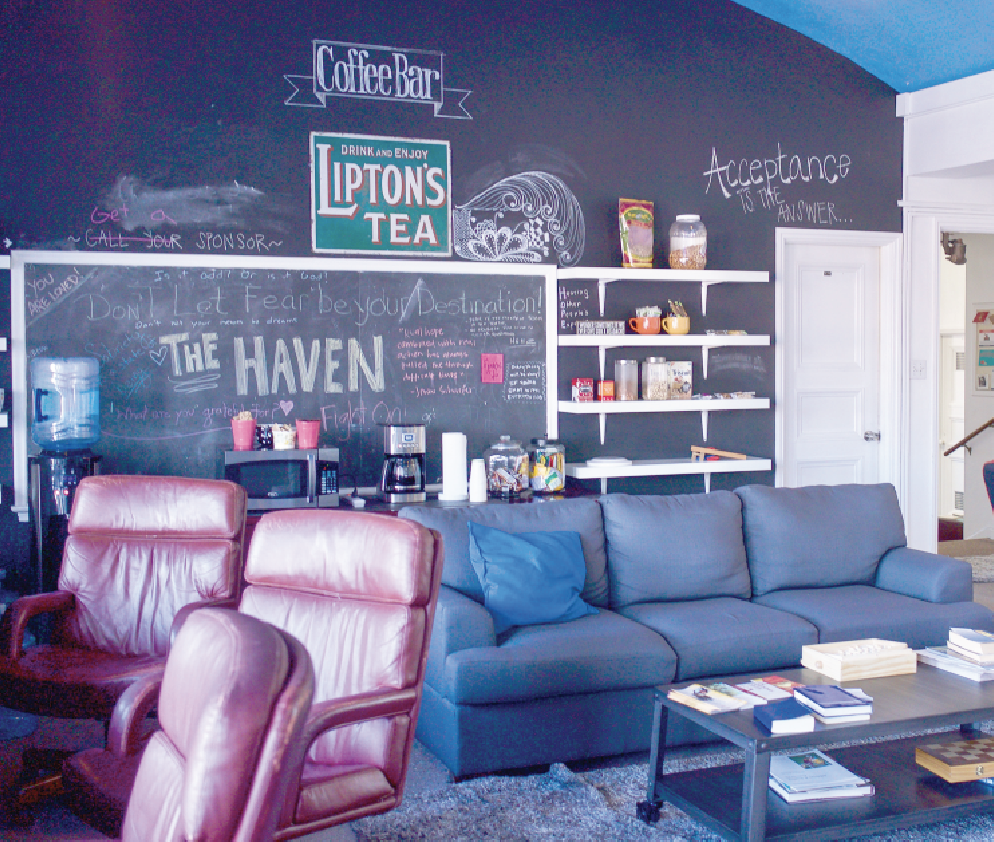The Haven helps students struggling with addiction

For Kevin, the journey to sobriety was lonely at first. But going to group therapy three times a week at the United University Church helped him realize that other students undergo similar experiences.
“My early sobriety was put into perspective because there were other people who had more time than me or people who had less time than me,” said Kevin, a senior majoring in economics. “It gave me a community that allowed me to get sober, stay sober and not have to [go down] the road alone.”
Kevin, who requested partial anonymity due to privacy concerns, found solace at The Haven at USC, a student recovery community that came to campus in 2013.
“That community allowed me to one, see other college students in sobriety . . . but two, allowed me to make friends outside of the group that I already have,” Kevin said. “I owe absolutely all of my sobriety now to them. They were the group, and still are the group, that allowed me to come to terms, but also allowed me to flourish in my sobriety.”
Kevin’s experience seeking support at The Haven is not unique. At the University’s request, The Haven expanded its programming this academic year to support more students. The Haven now offers three new programs: The Haven Mentoring and Monitoring Program, The Intensive Outpatient Program and the USC Brief Alcohol Screening and Interview for College Students and Cannabis Screening and Interview for College Students.
The BASICS/CASICS program is an educational outlet for students who have had alcohol or cannabis-related incidents at USC. Through two individual sessions that help students examine their own relationship with substances, BASICS/CASICS provides personalized feedback tailored to students’ specific situations.
In most cases, students are referred to this program by USC’s Student Judicial Affairs and Community Standards, coaches or members of the Greek community, often due to a specific incident or a pattern of misconduct related to alcohol or drug use.
The USC BASICS/CASICS education and prevention program was first announced mid-semester during Fall 2018 at the University’s request, and it is now officially in full operation for the spring semester.
The Haven last expanded in 2013, when the Center opened its doors at the Office of Religious Life. Prior to that, the student recovery center was not affiliated with USC. It was a residential program held on the roof of Gateway Apartments for students seeking substance abuse help.
Currently, the organization helps students in recovery, as well as those who want to discuss their alcohol or drug use. Weekly meetings are still held every Sunday evening but now take place at the Office of Religious Life.
Sophie Pyne, case manager and group facilitator at The Haven, said its mentoring and monitoring program uses a harm reduction model that gives students the chance to look at their relationship with drugs and alcohol. She said it allows students to honestly engage in dialogue about their habits with mentors and peers.
The Addiction Center reports that roughly 31 percent of college students across the United States have exhibited signs of alcohol abuse. The Haven’s three new programs aim to decrease these numbers on USC’s campus.
“The Mentoring and Monitoring Program is a harm reduction program . . . [We would] work with them and determine what is a good plan for you — what would you like to do,” said Rebecca Udell, clinical director of The Haven.
The Haven’s website states that the Mentoring and Monitoring Program helps students, parents and school administrators promote education and mentorship regarding substance abuse and misuse among college students.
“[The Mentoring and Monitoring Program] allowed me to check in on where I was at,” Kevin said. “And more importantly, [it] kind of forced me to get honest.”
According to Pyne, the Intensive Outpatient Program is a service to help students whose substance addiction begins to take over their lives — the program runs nine hours each week. Through group and individual therapy, along with academic advising, students are able to stay in school while also seeking treatment for their addictions.
Kevin has been involved in the Intensive Outpatient Program for a few months now, where he has received mentorship and advising from The Haven staff and professionals.
“[The Intensive Outpatient program is] bridging the gap [for] students who had to leave the University to take medical leave,” Pyne said. “They were actually able to stay on campus and get treatment while they were still in school.”
Udell said The Haven helps integrate students back into the University community while also ensuring that they receive adequate support.
“[The Intensive Outpatient program is] a place where they’ve got that support,” Udell said. “And so it’s like the next step — they reintegrate into the academic setting while having a nice hub in the sober community,”
The Haven is not strictly an abstinence program. Instead, it serves as a tool to give students the chance to start a discussion about their relationship with drugs and alcohol.
“[The Haven gave] me a chance to finally start to put my [life] together and therefore put my sobriety together,” Kevin said. “That was the cornerstone on getting my life back on track.”
Since joining The Haven in 2018, Kevin has remained six months sober. He is set to graduate in May.

